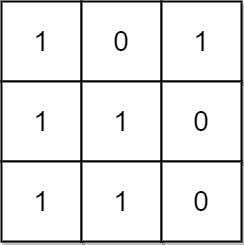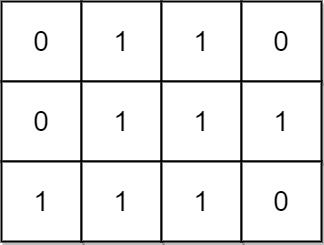Welcome to Subscribe On Youtube
1504. Count Submatrices With All Ones
Description
Given an m x n binary matrix mat, return the number of submatrices that have all ones.
Example 1:

Input: mat = [[1,0,1],[1,1,0],[1,1,0]] Output: 13 Explanation: There are 6 rectangles of side 1x1. There are 2 rectangles of side 1x2. There are 3 rectangles of side 2x1. There is 1 rectangle of side 2x2. There is 1 rectangle of side 3x1. Total number of rectangles = 6 + 2 + 3 + 1 + 1 = 13.
Example 2:

Input: mat = [[0,1,1,0],[0,1,1,1],[1,1,1,0]] Output: 24 Explanation: There are 8 rectangles of side 1x1. There are 5 rectangles of side 1x2. There are 2 rectangles of side 1x3. There are 4 rectangles of side 2x1. There are 2 rectangles of side 2x2. There are 2 rectangles of side 3x1. There is 1 rectangle of side 3x2. Total number of rectangles = 8 + 5 + 2 + 4 + 2 + 2 + 1 = 24.
Constraints:
1 <= m, n <= 150mat[i][j]is either0or1.
Solutions
-
class Solution { public int numSubmat(int[][] mat) { int m = mat.length, n = mat[0].length; int[][] g = new int[m][n]; for (int i = 0; i < m; ++i) { for (int j = 0; j < n; ++j) { if (mat[i][j] == 1) { g[i][j] = j == 0 ? 1 : 1 + g[i][j - 1]; } } } int ans = 0; for (int i = 0; i < m; ++i) { for (int j = 0; j < n; ++j) { int col = 1 << 30; for (int k = i; k >= 0 && col > 0; --k) { col = Math.min(col, g[k][j]); ans += col; } } } return ans; } } -
class Solution { public: int numSubmat(vector<vector<int>>& mat) { int m = mat.size(), n = mat[0].size(); vector<vector<int>> g(m, vector<int>(n)); for (int i = 0; i < m; ++i) { for (int j = 0; j < n; ++j) { if (mat[i][j] == 1) { g[i][j] = j == 0 ? 1 : 1 + g[i][j - 1]; } } } int ans = 0; for (int i = 0; i < m; ++i) { for (int j = 0; j < n; ++j) { int col = 1 << 30; for (int k = i; k >= 0 && col > 0; --k) { col = min(col, g[k][j]); ans += col; } } } return ans; } }; -
class Solution: def numSubmat(self, mat: List[List[int]]) -> int: m, n = len(mat), len(mat[0]) g = [[0] * n for _ in range(m)] for i in range(m): for j in range(n): if mat[i][j]: g[i][j] = 1 if j == 0 else 1 + g[i][j - 1] ans = 0 for i in range(m): for j in range(n): col = inf for k in range(i, -1, -1): col = min(col, g[k][j]) ans += col return ans -
func numSubmat(mat [][]int) (ans int) { m, n := len(mat), len(mat[0]) g := make([][]int, m) for i := range g { g[i] = make([]int, n) for j := range g[i] { if mat[i][j] == 1 { if j == 0 { g[i][j] = 1 } else { g[i][j] = 1 + g[i][j-1] } } } } for i := range g { for j := range g[i] { col := 1 << 30 for k := i; k >= 0 && col > 0; k-- { col = min(col, g[k][j]) ans += col } } } return } -
function numSubmat(mat: number[][]): number { const m = mat.length; const n = mat[0].length; const g: number[][] = Array.from({ length: m }, () => Array(n).fill(0)); for (let i = 0; i < m; i++) { for (let j = 0; j < n; j++) { if (mat[i][j]) { g[i][j] = j === 0 ? 1 : 1 + g[i][j - 1]; } } } let ans = 0; for (let i = 0; i < m; i++) { for (let j = 0; j < n; j++) { let col = Infinity; for (let k = i; k >= 0; k--) { col = Math.min(col, g[k][j]); ans += col; } } } return ans; } -
/** * @param {number[][]} mat * @return {number} */ var numSubmat = function (mat) { const m = mat.length; const n = mat[0].length; const g = Array.from({ length: m }, () => Array(n).fill(0)); for (let i = 0; i < m; i++) { for (let j = 0; j < n; j++) { if (mat[i][j]) { g[i][j] = j === 0 ? 1 : 1 + g[i][j - 1]; } } } let ans = 0; for (let i = 0; i < m; i++) { for (let j = 0; j < n; j++) { let col = Infinity; for (let k = i; k >= 0; k--) { col = Math.min(col, g[k][j]); ans += col; } } } return ans; }; -
impl Solution { pub fn num_submat(mat: Vec<Vec<i32>>) -> i32 { let m = mat.len(); let n = mat[0].len(); let mut g = vec![vec![0; n]; m]; for i in 0..m { for j in 0..n { if mat[i][j] == 1 { if j == 0 { g[i][j] = 1; } else { g[i][j] = 1 + g[i][j - 1]; } } } } let mut ans = 0; for i in 0..m { for j in 0..n { let mut col = i32::MAX; let mut k = i as i32; while k >= 0 && col > 0 { col = col.min(g[k as usize][j]); ans += col; k -= 1; } } } ans } }